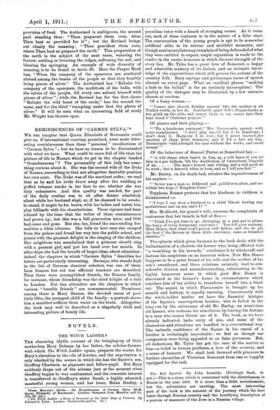REMINISCENCES OF " CARMEN SYLVA."*
WE can imagine that Queen Elizabeth of Roumania could give us, if international courtesy permitted, even more inter- esting reminiscences than these " personal " recollections of " Carmen Sylva "; but we have no reason to be discontented with what we have. What could be more full of life than the picture of life in Nassau which we get in the chapter headed " Grandmamma " P The personality of this lady has some- thing curious about it. She was the second wife of the Duke of Nassau, succeeding in that not altogether desirable position her own aunt. The Duke was of the martinet order; we read that as he and his bride drove away after the wedding be puffed tobacco smoke in her face to see whether she was duly submissive. And this quality was needed, for part of the daily routine was to sit after dinner absolutely silent while her husband slept, or, if he chanced to be awake, to stand, it might be for hours, with her ladies and watch him play billiards with his chamberlains. These rigours had been relaxed by the time that the writer of these reminiscences had grown up ; but this was a full generation later, and 1848 had come and gone. But she, too, found the surrounding for- malities a little irksome. She tells us how once she escaped from the palace and found her way into the public school, and joined with the greatest delight in the singing of the children. Her neighbour was scandalised that a princess should sing with a peasant girl, and put her hand over her mouth. In after-days she had the benefit of larger ideas about education ; indeed the chapters in which " Carmen Sylva " describes her tutors are particularly interesting. Beraays, who stands high in the list of German classical scholars, was one of them. Less famous but not less efficient teachers are described. Then there were accomplished friends, the Bunsen family, for instance, whose friendship was the chief delight of a visit to London. Not less attractive are the chapters in which various " humble friends " are commemorated. Prominent among these is Mary Barnes, the devoted nurse of poor little Otto, the youngest child of the family : a portrait shows him a manifest sufferer from water on the brain. Altogether the book may well be described as a singularly vivid and interesting picture of family life.










































 Previous page
Previous page